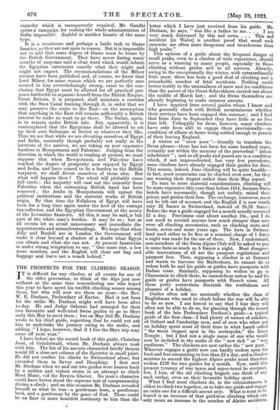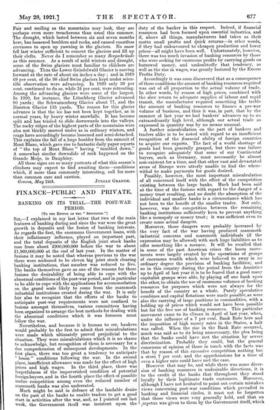THE PROSPECTS FOR THE CLIMBING SEASON.
IT is difficult for any climber, at all events for one of the older generation, to think of the Alps just now without at the same time remembering one whO hoped this year to have spent his twelfth climbing season among them, but who will now see them no more—the Rev. W. E. Durham, Prebendary of Exeter. Had it not been for the strike Mr. Durham might well have been alive to-day. He and Judge Osborne had arranged for their two favourite and well-tried Swiss guides to go to Skye early this May to meet them ; but on May 2nd Mr. Durham wrote to his chief guide, regretting that he could not ask him to undertake the journey owing to the strike, and adding, "I hope, however, that if I live the Skye trip may come off next year."
I have before me the record book of this guide, Christian Josai, of Grindelwald, whom Mr. Durham always took with him. The list of his ascents chronicled briefly therein would fill a close-set column of the Spectator in small print. He did not confine his climbs to Switzerland alone, but extended them to Savoy and Dauphiny. I first met Mr. Durham when we and our two guides were beaten back by a sudden and violent storm in an attempt to climb Mont Blanc, vid the Brenva Glacier. No man's character could have better stood the supreme test of companionship during a climb ; and on this occasion Mr. Durham revealed himself as what he was—a gentleman born, a gentleman bred, and a gentleman by the grace of God. There could be no finer or more heartfelt testimony to him than the letter which I have just received from his guide. Mr. Durham, he says, "was like a father to me. . . . I am very much distressed by this sad news. . . . This sad accident [in Wales] is another proof that small rock summits are often more dangerous and treacherous than high peaks."
This opinion of a guide about the frequent danger oi small peaks, even to a climber of wide experience, should serve as a warning to many people, especially to those climbing without guides and to all novices. Already, owing to the exceptionally dry winter, with extraordinarily little snow, there has been a good deal of climbing and a remarkable number of fatal accidents. Nothing could better testify to the unusualness of snow and ice conditions than the ascent of the Great Schreckhorn carried out about the middle of March last • and the Swiss themselves arc already beginning to make summer ascents. I have inquired from several guides whom I know and who generally climb with British mountaineers whether their services have been engaged this summer ; and I find that from June to September they have little or no free time left. Unhappily for them, however, many climbers have only been able to engage them provisionally—on condition of affairs at home being settled enough to permit of their leaving England.
A winter so "snow poor "—literally to translate the Swiss phrase—there has not been for some hundred years, certainly not within the memory of the proverbial "oldest inhabitant " ; and as all peaks and passes are in a condition which, if not unprecedented, has very few precedents, some climbers have already engaged their guides for June. This season, indeed, June climbing will be quite feasible— in fact, most mountains can be climbed even now, for they are wearing their August rather than their May. aspect.
To turn to more material considerations, climbing will be more expensive this year than before 1914, because Swiss hotels have necessarily, though not unduly, raised theiz prices, and guides their fees. The exchange, moreover, must not be left out of account, and the English 1 is now worth only 22 francs in Switzerland, instead of 25.25 fratc3. Before the war a guide engaged for a month usually received /1 a day. Provisions cost about another 10s., and I do not need to remind anyone how much cheaper than now were all climbing accessories, such as climbing suits and boots, seven and more years ago. The huts in Switzer- land used either to be free or a nominal charge of 1 frarc a night was made for the use of them. Now, I understand, non-members of the Swiss Alpine Club will be asked to pay in some huts as much as 5 francs a night. Most disagree- able innovations of all are the passport regulations and passport fees. Thus, supposing a climber is at Zermatt and wants to traverse the Matterhorn he cannot do so unless both he and his guide or guides have passports with Italian visas. Similarly, supposing he wishes to go to Chamounix to climb there, he cannot do so unless he and his guide or guides have passports with French visas. All these petty restrictions diminish the restfulness and pleasure of a holiday. Guides often ask me anxiously whether the class of Englishman who used to climb before the war will be able to do so now. I am forced to say that I fear they will often not be able to do so, for glancing through the record book of the late Prebendary Durham's guide—a typical guide of the first class—I find plenty of names of scholars, of Oxford and Cambridge men, and of men who when not on holiday spent most of their time in what Lamb called "the 'most elegant spot in the metropolis," the Inner Temple ; but I find not a single name of one who would now be included in the ranks of the "new rich" or "war profiteers." The climbers are now rather the "new poor. Whoever engages a guide now can hardly reckon upon his food and fees amounting to less than £2 a day, and a climber anxious to ascend the highest Alpine peaks must therefore reckon £120 for two guides for a month. Now, until this present tyranny of war taxes and super-taxe; be overpast, few, I fear, of the old climbing brigade can think of any such outlay, even on their favourite holiday sport. What I find most climbers do, in the circumstances, is either to climb two together, or to take one guide and engage an extra one for a difficult ascent only. What is most to be feared is an increase of that guideless climbing which can only mean an increase in the number of Alpine accident& Fair and sniffing as the mountains may look, they are .perhaps even more treacherous than usual this summer. The drought, which lasted between six and seven months here, has loosened boulders and rocks, and caused countless crevasses to open up yawning in the glaciers. No snow fell last winter sufficient to cement the glaciers and fill up their clefts. Never do I remember so many Bergschriintle as this summer. As a result of mild winters and drought, some of the Swiss glaciers most familiar to climbers are advancing. Thus the Lower Grindelwald Glacier is moving forward at the rate of about six inches a day ; and in 1919 69 per cent, of the 98 chief Swiss glaciers kept under scien- tific observation were advancing. In 1920 only 59 per cent, continued to do so, while 34 per cent. were retreating. Among the advancing glaciers were some of the largest. In 1920, for instance, the Lotschberg Glacier advanced 90 yards ; the Schwarzenberg Glacier about 77, and the Biserten Glacier 115 yards. The reason for this glacier advance is that the ice has not been kept together, as in normal years, by heavy winter snowfalls. It has become split and has tended to slide downwards into the valleys. The rocky ridges of the highest parts of the mountains were also not thickly snowed under as in ordinary winters, and crags have accordingly become loosened and semi-detached. This explains the fall of a huge boulder from the summit of Mont Blanc, which gave rise to fantastic daily paper reports of "the top of Mont Blanc" having "tumbled down." A somewhat similar downslide of rock happened on the Grande Meije, in Dauphiny. All these signs are so many portents of what this season's climbers may expect to find awaiting them—conditions which, if more than commonly interesting, call for more than common care and caution.



































 Previous page
Previous page